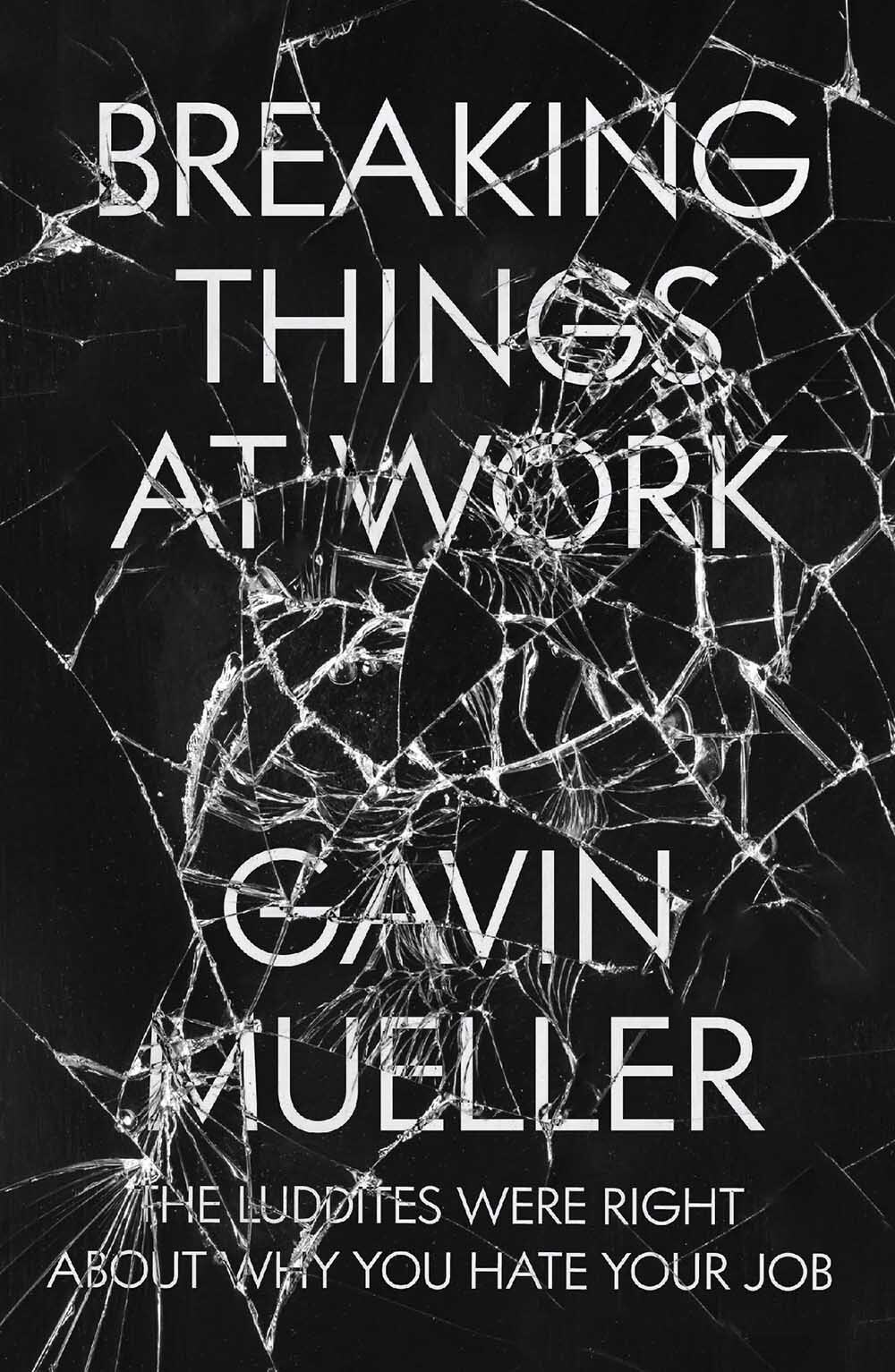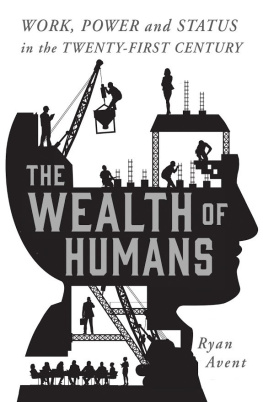Contents

Breaking Things at Work
Breaking Things at Work
The Luddites Are Right about
Why You Hate Your Job
Gavin Mueller

For Finn and Eve, my children.
First published by Verso 2021
Gavin Mueller 2021
All rights reserved
The moral rights of the author have been asserted
1 3 5 7 9 10 8 6 4 2
Verso
UK: 6 Meard Street, London W1F 0EG
US: 20 Jay Street, Suite 1010, Brooklyn, NY 11201
versobooks.com
Verso is the imprint of New Left Books
ISBN-13: 978-1-78663-677-5
ISBN-13: 978-1-78663-675-1 (UK EBK)
ISBN-13: 978-1-78663-676-8 (US EBK)
British Library Cataloguing in Publication Data
A catalogue record for this book is available from the British Library
Library of Congress Cataloging-in-Publication Data
A catalog record for this book is available from the Library of Congress
Library of Congress Control Number: 2020948684
Typeset in Sabon by MJ & N Gavan, Truro, Cornwall
Printed and bound by CPI Group (UK) Ltd, Croydon CR0 4YY
Contents
Writing this book has required a journey through three cities, two continents, multiple jobs and gigs, and even a spate of unemployment. This is to say that it, for better or for worse, is a product of academic precarity. As far as I know, all my subsequent work will be. And I also know first-hand how difficult it is to produce under such conditions: frantic bursts of overwork punctuated by stretches of debilitating underwork, uprooting from intellectual and social networks, the Sisyphean feeling of starting in a new place, yet again, from scratch. You lose track of people, they lose track of you. Plans and projects easily dissipate in such an atmosphere. I can only imagine the wonderful work that wont see the light of day due to these conditions. It is a fate that could have just as easily befallen this book.
The fact that I was able to produce this book is only due to the consistencies and continuities I was able to establish in my life. First, above all was my wife, Katie. Second, was my ongoing commitment to Viewpoint Magazine , where I concretized much of the perspective that marks this book: my resistance to teleological views of history and ontological accounts of class, my abiding interest in struggles from below and beyond official institutions and ideologies of the left. This is, I am confident saying, a very Viewpoint book in its theoretical and political commitments.
The Marxist intellectual tradition has never been content to rest on credentialed experts, but spreads its purview widely to all manner of homegrown theoreticians, hobbyist auto-didacts, zine-writing worker-militants, roving antinomian bohemians, and, yes, its share of university professors. This motley assemblage of intellectual production, its contentious and fragmentary unity, is one thing that makes Marxism so exciting to me, and in this book I have attempted to be true to the heterogeneity of its practitioners. To put it another way, I strive to be faithful to Marxisms heretical side, its unofficial channels and para-academic spaces, as in spite of my academic credentials, these are what have ultimately shaped me and my work. And so here, somewhat oddly for a book on Luddism, Id like to acknowledge the vibrant corners of my social media networks that have made an indelible mark on this book, in particular the Relaxed Marxist Discussion Facebook group.
I would also like to acknowledge a few individuals significant in the genesis of this work. My erstwhile colleague at Dallas, Andrew Culp, provided important conversations and a leg up in the formalities of proposing a book. Lisa Furchgott provided me with crucial historical sources at an early stage. I would especially like to thank the patience and perspicacity of my editor at Verso Books, Ben Mabie, who stuck with me on this longer-than-expected journey.
Jeff Bezos is going to the moon. In May of 2019, just a few blocks from the White House, he unveiled the lunar lander developed by his secretive Blue Origin space exploration company to the jaunty falsetto harmonies of Electric Light Orchestras Mr. Blue Sky. New York Times journalist Kenneth Chang likened the gala, dubbed the Going to Space to Benefit Earth event, to the announcement of an iPhone. We are going to build a road to space, the Amazon CEO vowed, extending a hand to the Trump administrations own ambitions to send astronauts to the moon. And then amazing things will happen.
But, for Bezos, space colonies are serious business. Not because they can solve the intractable problems of Earth: global poverty and environmental degradation are mere short-term problems. With Earths supply of resources dwindling, the future of technological progress itself relies on drawing from the vast quantities of minerals locked away in distant celestial bodies. Humanity will have go along for the ride.
Of course, Bezos isnt the only billionaire betting big on outer space. Elon Musks flashier SpaceX has its sights set on
Not all of our tech billionaires want to travel the space-ways, but they all share something in common (that is, aside from a propensity to dine with the late sex-trafficking financier Jeffrey Epstein). They believe that technology lays a path to a brighter future, that the progress of humanity is one and the same as the progress of machines and gizmos. Bill Gates wants to use computers to overhaul education, and genetically modified organisms to solve hunger in Africa; he also sponsors a competition to invent new toilets to address the lack of sanitation infrastructure in the global South. (The Gates Foundation recently granted a Goalkeepers Global Goals Award to Indias right-wing prime minister, Narendra Modi, for his dedication to the toilet cause.) Mark Zuckerberg, to his credit, acknowledges some of the shortcomings of his own company. I used to think that if we just gave people a voice and helped them connect, that would make the world better by itself. In many ways it has. But our society is still divided, he writes in, naturally, a Facebook post. Now I believe we have a responsibility to do even more. Its not enough to simply connect the world, we must also work to bring the world closer together. Never one for excessively creative thinking, Zuck argues that solving the problems exacerbated by Facebook requires, well, more Facebook.
In a more muted register, the Lolita Expresstraveling Harvard psychologist Steven Pinker, who is something of a Dr. Pangloss of the Davos set, wants you to know youve never had it so good. In his 2018 Enlightenment Now , Pinker seeks to combat progressophobia, an affliction caused by liberal arts intellectuals who assign Theodor Adorno and Jean-Paul Sartre to their young charges.
While the technological optimism of billionaires comes from the political right and center, it can also be found on the radical left, where so-called accelerationists anticipate a fully automated luxury communism on the back of the wildest fantasies of Silicon Valley entrepreneurs, and the self-proclaimed pro-science left embrace the logistical organization of the most exploitative businesses on the planet. The accelerationists are, as they often point out, subscribing to a prevalent view from within the Marxist tradition. Historically, Marxists have not been critical of technology, even when that technology is deployed in the workplace in ways that seem detrimental for workers. For many Marxists, technology is at worst neutral: it is not the technology itself, but who controls it, labor or capital. And for some of them, technology, even when wielded by capitalists, is a boon to socialism, creating the conditions of radical transformation right under the bosses noses. This means that a socialist movement should treat technological development, even if it has negative consequences in the short term, as something positive.











